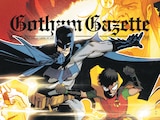Since this is the last Couch Club of June, it seems appropriate to honor Pride Month by looking at the journey of Larry Trainor, the Doom Patrol’s own Negative Man. In the comics, Larry is a heterosexual man (he briefly had feelings for Rita), but the Doom Patrol television series reimagined him as a homosexual man from the 1950s coming to terms with his identity. This character change led to a powerful emotional arc for Negative Man, and I feel like there are some important lessons to take from it.
While Negative Man wasn’t originally conceived a closeted homosexual, it’s interesting how much of his character design compliments the storyline. As we first meet Larry, he’s ashamed of his sexuality and doesn’t have a high opinion of himself, and the bandages that cover him almost seem like a visual representation of that. Sure, they’re meant to protect everyone from the dangerous radiation, but it’s hard to ignore the bandages as symbolism, even if it’s coincidental. Even the name Negative Man speaks to Larry’s state of mind. The Larry Trainor audiences meet in the Doom Patrol premiere is very much a victim of his own negativity. Thankfully, though, he got better.

One of the most well-received scenes of the season was when Larry gleefully sang Kelly Clarkson’s “People Like Us” to a packed house of dancing souls. I love that scene. It’s one of my favorites, but it also makes me feel incredibly sad for Larry. The entire sequence takes place in his head, because at this point in his life his imagination is the only place where he could be free. He pictures himself as he was before his accident (and why wouldn’t he?), once again showing that he can’t accept himself for who he currently is. The lyrics speak about healing from heartbreak, but Larry can’t bring himself to do that yet.
The biggest kick in the gut comes at the end of the song when the fantasy is revealed and the real-life Larry looks at the microphone and briefly considers letting himself shine. Instead, he refuses the offer and simply states “I don’t sing” before walking away. Maybe I’m reading too much into the phrasing of Larry’s reply, but I find the simple and understated “I don’t sing” tragic. When he says he doesn’t sing, he’s saying he doesn’t embrace joy. Larry is wallowing in his own depression. He hasn’t let “let himself sing” for decades. Watch the scene again with that in mind, and you’ll get so much more out of it emotionally.

Cliff had a desire to fix his life and sought out his daughter to reconnect. Larry was too down on himself to do anything similar. His sons are both grown, and he never felt the need to seek them out because he thought any sort of relationship with them would only be a burden. He deeply regrets the way things ended up with his former love John Bowers, and even though he agonized over it for decades, he never took the steps to seek him out for closure. Indeed, when we first meet Larry in Doom Patrol, he had given up on love, life and himself. Can you imagine a more tragic way to spend decades?
I hope I haven’t depressed you too much because I also feel that Larry’s story is an inspiring one about pride and acceptance. Yes, he was in a miserable state of mind when the series began, but by the end of the season, Larry was able to grow and finally start to live. To do this, he had to make peace with three different people: John Bowers, the Negative Spirit and himself. Only then was he able to find pride and start living the life he deserved.

Although Larry didn’t say much about it, I think his time on Danny the Street was eye opening for him. It was full of people celebrating themselves and unashamed of their sexuality. That was unheard of for a man who was forced to live in the closet back in the 1950s. Larry saw that life could be different, and if the citizens of Danny had nothing to hide, then why should he?
Once Larry stopped resenting the Negative Spirit, he was able to learn that the energy being was as much of a prisoner as he was. It turned out that the Negative Spirit wanted to help Larry, and it sensed his pain. Once Larry started listening to the spirit that was trapped in his body, he was able to learn to live with it and even use it to help improve his life. There might be some symbolism there that people can learn from. Don’t hate yourself and reject who you are. Once you begin to embrace it, your life will flourish.
The Negative Spirit also pushed Larry to make peace with John Bowers. That was another important (and utterly heartbreaking scene). Thankfully, Larry was able to get to John before he died, and although they would never be together romantically, Larry was able to cradle John in his arms as he passed away. They were able to discuss their failed love affair, allowing Larry to get closure and let go of the regret he had carried with him for decades.

When I watch Larry during the final episodes of Doom Patrol’s first season, my heart is warmed to see how much he has grown. He seems so at peace with himself, and no longer carries his emotional burdens. Listen to the way Matt Bomer delivers his lines in the first episode, and then compare it to the season finale. He even sounds happier in the way that he speaks. It may have taken him over 90 years, but thanks to his prolonged mortality from the Negative Spirit, he can now live the rest of his life (however long that is) as the free person he should’ve been all along.
So, the next time you’re on Danny the Street and someone hands you a microphone, don’t tell them you don’t sing. Instead, grab the microphone with fierce intensity and sing proudly, even if it’s off key. I have a feeling that’s what Larry will do if he’s ever given the choice again.
Doom Patrol Season 1 is now available to stream in full on DC Universe. Not yet a member? Click here to subscribe now.
Joshua Lapin-Bertone writes about TV, movies and comics for DCComics.com and DCUniverse.com, is a regular contributor to the Couch Club and writes our monthly Batman column, "Gotham Gazette." Follow him on Twitter at @TBUJosh.















